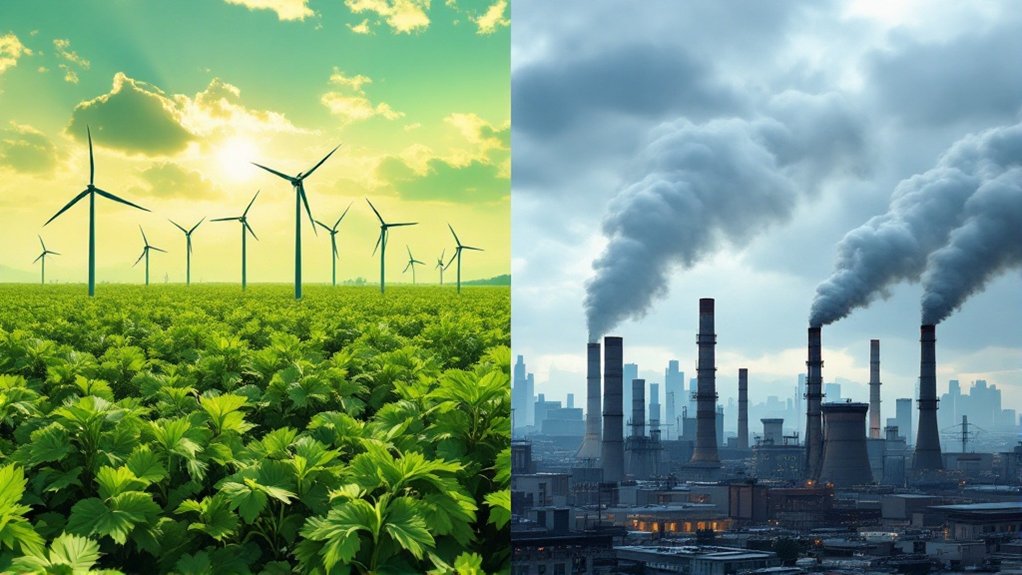Decarbonization strategies represent a pivotal shift in business practices, contrasting sharply with traditional models that prioritize immediate profits. This approach emphasizes long-term sustainability and environmental responsibility. As companies navigate today’s market, they face pressing questions about efficiency and innovation. The implications of these strategies are profound, influencing not just operational frameworks but also financial outcomes. What remains to be seen is how businesses will adapt to these challenges in an ever-evolving landscape.
Understanding Decarbonization: Definition and Importance
Decarbonization refers to the process of reducing carbon dioxide emissions, an essential strategy for addressing climate change. This process encompasses a variety of approaches, including shifting to renewable energy sources, enhancing energy efficiency, and adopting carbon capture technologies. The importance of decarbonization lies in its potential to mitigate the impacts of global warming, improve air quality, and foster sustainable economic growth. By decreasing reliance on fossil fuels, societies can create healthier environments and promote resilience against climate-related disasters. Additionally, decarbonization encourages innovation and the development of green technologies, ultimately leading to a more sustainable future. As awareness of climate change rises, the urgency for effective decarbonization strategies becomes increasingly apparent, prompting action from governments, businesses, and individuals alike. Moreover, robust policy frameworks are essential to harness the full potential of innovation in deep decarbonization.
The Traditional Business Model: Profit Over Sustainability
The traditional business model often prioritizes short-term gains at the expense of sustainable practices. This focus on immediate profit frequently leads to environmental neglect, as companies may overlook the long-term consequences of their actions. As a result, the balance between economic success and ecological responsibility becomes increasingly challenging to maintain. Furthermore, this approach can stifle innovation and hinder the development of new clean technologies, which are essential for a sustainable future.
Short-Term Gains Focus
Emphasizing short-term gains, traditional business models often prioritize immediate profits over long-term sustainability. This approach typically fosters a reactive mindset, where companies focus on quarterly earnings rather than strategic investments in sustainable practices. By concentrating on quick returns, businesses may overlook opportunities for innovation that align with environmental goals. The allure of rapid financial success can lead to decisions that maximize short-lived profits, such as cost-cutting measures that neglect sustainable resource management. Consequently, this mindset can stifle the potential for integrating sustainable practices that not only benefit the environment but also enhance long-term profitability. Ultimately, the short-term gains focus may hinder a company’s ability to adapt to evolving market demands centered around sustainability and responsible business practices.
Environmental Neglect Prioritized
While pursuing immediate financial returns, many traditional business models often prioritize profit over environmental sustainability, resulting in significant neglect of ecological responsibilities. This focus on short-term gains frequently leads to practices such as excessive resource extraction, pollution, and waste generation. Companies may disregard regulatory guidelines or environmental impacts, believing that compliance costs outweigh potential profits. As a result, ecosystems suffer, biodiversity declines, and climate change accelerates. This neglect not only harms the environment but also poses long-term risks to businesses themselves, as consumers increasingly favor sustainable practices. The traditional business paradigm, fixated on maximizing shareholder value, often overlooks the necessity of integrating environmental considerations into strategic planning, ultimately jeopardizing both ecological integrity and future economic viability.
Key Drivers of Decarbonization in Today’s Market
In today’s market, regulatory pressure and compliance requirements are increasingly compelling businesses to adopt decarbonization strategies. Simultaneously, there is a growing market demand for sustainable practices, prompting companies to rethink their operations. These factors are becoming essential drivers for organizations aiming to align with environmental expectations and consumer preferences. Furthermore, prioritizing incentives for renewable energy can significantly enhance the effectiveness of these decarbonization efforts.
Regulatory Pressure and Compliance
How do regulatory pressures shape the landscape of decarbonization? Regulatory frameworks are increasingly influencing corporate strategies related to carbon emissions. Governments worldwide are implementing stringent policies aimed at reducing greenhouse gas emissions, compelling businesses to adopt decarbonization measures. Compliance with these regulations not only mitigates the risk of fines and penalties but also enhances corporate reputation. Additionally, regulatory pressure fosters innovation, prompting companies to develop sustainable technologies and practices. The urgency of climate change is reflected in initiatives such as carbon pricing and emissions trading systems, which further drive organizations to prioritize sustainability. Consequently, firms that proactively adapt to regulatory requirements can gain a competitive edge, positioning themselves favorably in an evolving market increasingly focused on environmental responsibility.
Market Demand for Sustainability
Regulatory pressures have laid the groundwork for a significant shift in market dynamics, where consumer demand for sustainability is increasingly shaping business strategies. Today, consumers are more informed and concerned about environmental impacts, leading to a heightened expectation for companies to adopt sustainable practices. This demand influences purchasing decisions, with many consumers willing to pay a premium for eco-friendly products. Businesses are responding by integrating sustainability into their core offerings, from sourcing materials responsibly to reducing carbon footprints. Additionally, companies that prioritize sustainability often enjoy enhanced brand loyalty and reputation, which can translate into competitive advantages. As market trends evolve, embracing sustainability is no longer optional; it has become a critical factor for success in contemporary business landscapes.
Comparing Operational Frameworks: Efficiency vs. Sustainability
While traditional business approaches often prioritize operational efficiency to maximize profits, the rise of decarbonization strategies introduces a new paradigm that emphasizes sustainability alongside economic performance. In this evolving landscape, organizations must balance short-term gains with long-term environmental responsibilities. Efficiency typically focuses on reducing costs and increasing productivity, often at the expense of ecological considerations. Conversely, sustainability encourages businesses to implement practices that not only minimize carbon footprints but also enhance social well-being. This shift necessitates a re-evaluation of key performance indicators, moving beyond profit margins to include metrics that assess environmental impact. Companies adopting sustainable frameworks may initially face higher operational costs, yet they position themselves favorably in an increasingly eco-conscious market, paving the way for future resilience and competitiveness. Moreover, embracing energy efficiency can lead to substantial savings and emissions reductions, reinforcing the business case for sustainability.
Financial Implications of Decarbonization Strategies
The financial implications of adopting decarbonization strategies are significant, influencing both short-term expenditures and long-term financial performance. Initially, companies may face high capital costs associated with implementing sustainable technologies and practices, such as renewable energy installations and energy-efficient equipment. However, these investments can lead to substantial operational savings over time, reducing energy costs and minimizing regulatory compliance expenses. Additionally, organizations that embrace decarbonization may enhance their brand reputation, attracting environmentally conscious consumers and investors. This shift can also mitigate risks associated with climate change and regulatory changes. Ultimately, while decarbonization strategies require upfront investment, they can yield favorable financial outcomes, positioning businesses for resilience and profitability in an increasingly eco-conscious market. Moreover, investing in energy efficiency improvements not only cuts costs but also supports overall sustainability goals.
Innovation Through Green Practices: A Competitive Edge
As businesses increasingly prioritize sustainability, innovation through green practices emerges as a crucial competitive edge. Companies adopting environmentally friendly methods often find new revenue streams and enhance their market position. By integrating sustainable materials, energy-efficient technologies, and waste-reduction strategies, firms can differentiate themselves from competitors who rely on traditional practices. This shift not only attracts eco-conscious consumers but also fosters loyalty among existing customers. Additionally, innovative green solutions can lead to cost savings, improved operational efficiency, and a stronger brand reputation. Businesses that embrace sustainability are better positioned to adapt to regulatory changes and market demands, ultimately gaining an advantage in a rapidly evolving landscape. In this way, green innovation is not merely a trend; it is a strategic imperative for future success.
Challenges and Barriers to Implementing Decarbonization
Implementing decarbonization strategies presents numerous challenges and barriers that organizations must navigate to achieve sustainability goals. One major obstacle is the upfront financial investment required for new technologies and infrastructure, which can deter companies from committing to long-term changes. Additionally, existing regulatory frameworks may not adequately support innovative practices, creating uncertainty and risk for businesses. Resistance to change within organizational culture can further complicate the shift, as employees may be hesitant to adopt new processes. Furthermore, the complexity of supply chain management often makes it difficult to guarantee that all stakeholders are aligned with decarbonization efforts. Finally, fluctuating market conditions may hinder the ability to maintain consistent investments in sustainable initiatives, impeding overall progress toward carbon reduction targets.
Case Studies: Successful Transition to Sustainable Models
Examining successful case studies reveals how various organizations have effectively altered to sustainable models, overcoming considerable barriers along the way. For instance, a leading automotive manufacturer shifted to electric vehicle production, achieving a 30% reduction in carbon emissions within five years. This change involved substantial investments in research and development, alongside partnerships with renewable energy suppliers. Similarly, a multinational retailer adopted circular economy principles, considerably reducing waste through recycling and sustainable sourcing. This approach not only enhanced their brand reputation but also resulted in cost savings and increased customer loyalty. These examples illustrate that with strategic planning and commitment to sustainability, businesses can achieve remarkable transformations, positioning themselves favorably in an increasingly eco-conscious market.
Future Trends: The Evolving Landscape of Business Practices
The shift towards sustainable business practices is reshaping the future landscape of industries across the globe. Companies are increasingly prioritizing decarbonization, integrating eco-friendly technologies, and adopting circular economy principles. This evolution not only addresses environmental concerns but also enhances brand reputation and customer loyalty. Businesses are leveraging data analytics to optimize resource management and reduce waste, while collaboration among stakeholders is becoming essential for achieving sustainability goals. Regulatory frameworks are tightening, pushing organizations to innovate and adapt swiftly. Additionally, the rise of green finance and investment strategies reflects a growing recognition of sustainability as a core business driver. As these trends continue to evolve, companies that embrace sustainable practices will likely emerge as leaders in their respective markets, fostering a more sustainable global economy.
Frequently Asked Questions
How Can Small Businesses Adopt Decarbonization Strategies Effectively?
Small businesses can adopt effective decarbonization strategies by evaluating their carbon footprint, implementing energy-efficient practices, utilizing renewable energy sources, engaging employees in sustainability initiatives, and collaborating with local organizations to share resources and best practices.
What Role Does Consumer Demand Play in Driving Decarbonization?
Consumer demand greatly influences market trends, prompting businesses to adopt sustainable practices. As consumers increasingly prioritize eco-friendly products, companies adapt their offerings, driving innovation and accelerating the shift towards environmentally responsible operations in response to these preferences.
Are There Government Incentives for Businesses Pursuing Decarbonization?
Government incentives for businesses pursuing decarbonization often include tax breaks, grants, and subsidies. These financial supports encourage companies to adopt sustainable practices, ultimately fostering innovation and reducing carbon footprints within various industries and sectors.
How Does Decarbonization Impact Employee Engagement and Morale?
Decarbonization initiatives often enhance employee engagement and morale by fostering a sense of purpose. Workers tend to feel more motivated and connected to their company’s mission when contributing to environmental sustainability and positive societal impact.
Can Decarbonization Strategies Lead to Job Creation in Specific Sectors?
Decarbonization strategies have the potential to foster job creation, particularly in renewable energy, green technology, and sustainable practices. As sectors shift, new employment opportunities emerge, driving workforce demand and promoting economic growth in these areas.
Conclusion
Ultimately, the shift from traditional business approaches to decarbonization strategies represents a critical evolution in corporate philosophy. By prioritizing long-term sustainability over immediate profits, businesses not only contribute to environmental preservation but also position themselves for future success in a market increasingly driven by eco-conscious consumers. As operational frameworks evolve and innovation flourishes, companies embracing decarbonization will navigate challenges effectively, ensuring resilience and relevance in an ever-changing economic landscape.

